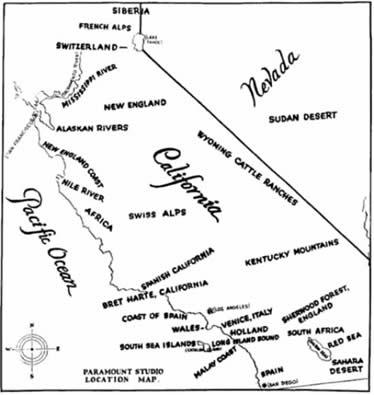Hollywood
 Between 1910 and 1915, virtually all film companies moved to
California.
Between 1910 and 1915, virtually all film companies moved to
California.
Originally, the independents might have left to
escape the trusts...but cheap land, good weather and great access to
scenery made the case for California.
However, it was really only production that moved. Finance and ownership usually stayed in the east. It's good to remember that most of the value of a company like M-G-M wasn't the studio. It was the finance and holding company that owned the theaters.
About this time the star system and studio system also began.
Next: stars
 The modern equivalent of the model of the movie business and the Hollywood studio is actually the fast food business, particularly McDonald's. Most people think of McDonald's as a company that sells fast food. In reality, it's mostly a real estate holding company with property assets estimated to be valued in the high 40 billions. McDonald's makes most of its profit from owning and leasing restaurant locations and then renting or subleasing them to its franchisees. This was the business model pretty much from the beginning. Harry Sonneborn (1916-1992), first president and CEO of McDonald's Corporation famously said: “We are not technically in the food business. We are in the real estate business. The only reason we sell 15-cent hamburgers is because they are the greatest producer of revenue, from which our tenants can pay us our rent.” Of course, movie companies had this idea long before Sonneborn. In Hollywood's golden era, almost all of the value in companies like Loews MGM, Paramount, and Warner Brothers was in the real estate they own and leased. Like Sonneborn said, showing the films allowed the tenants to pay the rent. The studios, stars, glamor and publicity were all in Southern California. The real money, the offices that controlled the real estate and most of the profit were in New York City and Chicago (You already know about Loews and M-G-M. M-G-M was the studio, but Loews in NYC was the money. Here's another: the real money at Paramount was the company that controlled the theaters, only some of which were called Paramount. That company's name was Balaban and Katz, and it was based in Chicago.).
The modern equivalent of the model of the movie business and the Hollywood studio is actually the fast food business, particularly McDonald's. Most people think of McDonald's as a company that sells fast food. In reality, it's mostly a real estate holding company with property assets estimated to be valued in the high 40 billions. McDonald's makes most of its profit from owning and leasing restaurant locations and then renting or subleasing them to its franchisees. This was the business model pretty much from the beginning. Harry Sonneborn (1916-1992), first president and CEO of McDonald's Corporation famously said: “We are not technically in the food business. We are in the real estate business. The only reason we sell 15-cent hamburgers is because they are the greatest producer of revenue, from which our tenants can pay us our rent.” Of course, movie companies had this idea long before Sonneborn. In Hollywood's golden era, almost all of the value in companies like Loews MGM, Paramount, and Warner Brothers was in the real estate they own and leased. Like Sonneborn said, showing the films allowed the tenants to pay the rent. The studios, stars, glamor and publicity were all in Southern California. The real money, the offices that controlled the real estate and most of the profit were in New York City and Chicago (You already know about Loews and M-G-M. M-G-M was the studio, but Loews in NYC was the money. Here's another: the real money at Paramount was the company that controlled the theaters, only some of which were called Paramount. That company's name was Balaban and Katz, and it was based in Chicago.).
 Between 1910 and 1915, virtually all film companies moved to
California.
Between 1910 and 1915, virtually all film companies moved to
California.  The modern equivalent of the model of the movie business and the Hollywood studio is actually the fast food business, particularly McDonald's. Most people think of McDonald's as a company that sells fast food. In reality, it's mostly a real estate holding company with property assets estimated to be valued in the high 40 billions. McDonald's makes most of its profit from owning and leasing restaurant locations and then renting or subleasing them to its franchisees. This was the business model pretty much from the beginning. Harry Sonneborn (1916-1992), first president and CEO of McDonald's Corporation famously said: “We are not technically in the food business. We are in the real estate business. The only reason we sell 15-cent hamburgers is because they are the greatest producer of revenue, from which our tenants can pay us our rent.” Of course, movie companies had this idea long before Sonneborn. In Hollywood's golden era, almost all of the value in companies like Loews MGM, Paramount, and Warner Brothers was in the real estate they own and leased. Like Sonneborn said, showing the films allowed the tenants to pay the rent. The studios, stars, glamor and publicity were all in Southern California. The real money, the offices that controlled the real estate and most of the profit were in New York City and Chicago (You already know about Loews and M-G-M. M-G-M was the studio, but Loews in NYC was the money. Here's another: the real money at Paramount was the company that controlled the theaters, only some of which were called Paramount. That company's name was Balaban and Katz, and it was based in Chicago.).
The modern equivalent of the model of the movie business and the Hollywood studio is actually the fast food business, particularly McDonald's. Most people think of McDonald's as a company that sells fast food. In reality, it's mostly a real estate holding company with property assets estimated to be valued in the high 40 billions. McDonald's makes most of its profit from owning and leasing restaurant locations and then renting or subleasing them to its franchisees. This was the business model pretty much from the beginning. Harry Sonneborn (1916-1992), first president and CEO of McDonald's Corporation famously said: “We are not technically in the food business. We are in the real estate business. The only reason we sell 15-cent hamburgers is because they are the greatest producer of revenue, from which our tenants can pay us our rent.” Of course, movie companies had this idea long before Sonneborn. In Hollywood's golden era, almost all of the value in companies like Loews MGM, Paramount, and Warner Brothers was in the real estate they own and leased. Like Sonneborn said, showing the films allowed the tenants to pay the rent. The studios, stars, glamor and publicity were all in Southern California. The real money, the offices that controlled the real estate and most of the profit were in New York City and Chicago (You already know about Loews and M-G-M. M-G-M was the studio, but Loews in NYC was the money. Here's another: the real money at Paramount was the company that controlled the theaters, only some of which were called Paramount. That company's name was Balaban and Katz, and it was based in Chicago.).